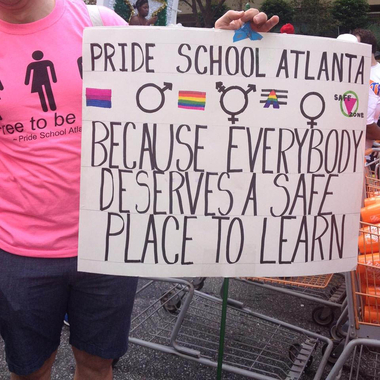School for LGBT youth called first of its kind in Georgia

By Rose French
The Atlanta Journal-Constitution
Atlanta (AP) — A first-of-its-kind private school in Georgia aimed at attracting lesbian, gay, bisexual and transgender youth and teachers is being established in Atlanta for students who feel bullied or not accepted in traditional schools.
Pride School Atlanta is a K-12 institution designed to be an alternative for LGBT students, though the school is open to any student who believes they're not getting the support they need for "being different," says Pride School founder Christian Zsilavetz.
"Kids have full permission to be themselves — as well as educators. Where there's no wondering, 'Is this teacher going to be a person for me to be myself with?'" said Zsilavetz, who is transgender and a veteran teacher with nearly 25 years of experience. "This is a place where they (students) can just open up and be the best person they can be."
Pride School will initially operate out of the Unitarian Universalist Congregation of Atlanta church and is expected to open by September 2016. Tuition will be around $13,000, though Zsilavetz says financial assistance is available for students who need it.
It is part of a small but growing group of schools popping up nationally geared toward educating LGBT youth, who feel disenfranchised from public education. Pride School would be the first of its kind in the Southeast and, according to gay rights advocates, a significant development for the LGBT movement.
"There's a number of kids who come from the South ... migrating to places like New York and other cities because they feel like it's more tolerant for them," said Ross Murray, programs director, global and U.S. South, for gay rights group GLAAD.
"They should be able to stay in their homes, their communities. I think having a school like this in Atlanta ... it means it's much more regionally connected. If a student does need a place where they can be safe from bullying, from peers who want to harass or harm them, they're not going to have to travel tons of distance to do that."
The school would be modeled after the Harvey Milk school in New York City and other education centers across the country designed for, but not limited to, LGBT youth. Pride School would be a so-called Free Model school with a setup more unstructured than traditional schools, where students' interests are supposed to drive what they learn.
Zsilavetz, 45, who's taught math and other subjects since 1992, says he never felt truly open or supported by administrators while teaching in public schools and wanted that to change. He wanted LGBT students and teachers to be able to openly discuss who they are in a school setting without fear.
"When (LGBT) kids can see you, when they know that they can come to you, they're less likely to die (or be suicidal), for one," Zsilavetz said. "They're less likely to get pregnant, when they don't really want to get pregnant. They're less likely to get into drugs and alcohol and into depression."
When Emma Grace, 16, heard from a friend about the Pride School, she contacted Zsilavetz and shared her interest in attending. Grace, who dropped out of high school and is currently home-schooled, said she was bullied at the public school she attended and that teachers and counselors did very little to stop it.
Grace, who identifies herself as "queer," says she's excited about the prospect of going to the Pride School and being more open about exploring her gender.
"I think it's greatly needed for a school to have LGBT-affirming surroundings and environment," she said. "It's still very much a hidden issue. Not a lot people talk about it because they're afraid."
Nearly 9 in 10 LGBT students report experiencing harassment within the last school year, and three in 10 report missing a class because they felt unsafe, according to gay rights group Georgia Equality. The group was among other advocates who lobbied state lawmakers to create legislation to reduce bullying in schools.
After the bill was signed into law in 2010, the group investigated school district policies in Georgia to see which districts had LGBT-specific bullying-prevention policies. It found fewer than 30 percent did.
"Since then we have been working with individual school districts to enact LGBT-inclusive policies that protect all Georgia students," according to the group's website.
In light of high-profile suicides of bullied LGBT students in recent years, a number of school districts have adopted stricter anti-bullying policies. Cobb County was one of the first in Georgia to implement an anti-bullying, no-harassment policy that included sexual orientation and gender identity.
The number of pro-LGBT organizations known as Gay-Straight Alliances at public high schools has also grown in Georgia, to 43.
Gay rights advocates point to other notable developments in Georgia as well. Members of the Atlanta Board of Education and school district staff marched in the 2015 Atlanta Pride Parade, highlighting the Anti-Defamation League's "No Place for Hate" programming in Atlanta Public Schools.
Last year, the first transgender student was named to a high school homecoming court in Georgia, a Walton High School student in Cobb County, who was recognized during the homecoming game.
Though strides have been made, public schools in Georgia still have a ways to go to build tolerance for LGBT students and teachers, Zsilavetz said.
"I think right now what a lot of (LGBT) students face is separate but equal education in the public schools," he said. "Because if you can't go to the bathroom all day and you can't use the locker room and you're bullied in the classroom and the teachers aren't standing up for you, you don't have a full seat at the table."
Information from: The Atlanta Journal-Constitution, Atlanta, GA.
Copyright 2016 The Associated Press. All rights reserved. This material may not be published, broadcast, rewritten or redistributed.
The Gayly – January 4, 2016 @ 10:10 a.m.





